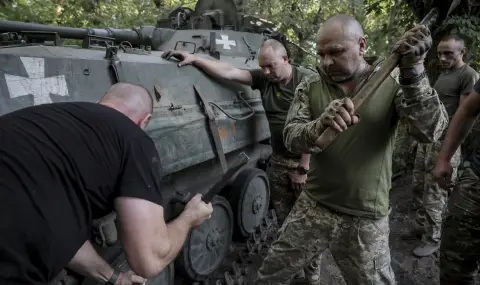After occupying Avdeyevka in early 2024, the Russian army began to advance in a western direction – to Pokrovsk, which is an important logistics center in the Donetsk region. In the spring, the Russians occupied Ocheretino and accelerated their advance towards Pokrovsk. In the last month, local residents have been evacuating en masse, expecting heavy fighting in the area.
"They are attacking us and they are three times more than us"
Meanwhile, it is here, on one of the most difficult sections of the front, that the Ukrainians experience the greatest shortage of men. “There are only four of us in our position, but we are regularly attacked by 20-30 Russians. It's been two years since I've been here, we're constantly experiencing a shortage of soldiers”, says a serviceman from the 59th Motorized Infantry Brigade of the Ukrainian Army.
According to the military with whom DV spoke, the reason for the success of the Russians in this direction is their great numerical superiority. “As far as I understand, they don't value their people very much. Those who attack us are three times more than us”, says an officer from the headquarters of the Ukrainian Territorial Defense. At the same time, the commander-in-chief of the Ukrainian army Oleksandr Sirsky recently stated that the advance of the Russians in the Pokrovsk region has been stopped, which was facilitated by the Ukrainian breakthrough near Kursk.
The Ukrainian military with whom DV spoke, however, give restrained assessments of this operation. “We are still short of people – those who are sufficiently well trained and motivated“, they repeat.
"Until the end I didn't want to go to war"
In the spring of this year, amendments to the mobilization law came into force in Ukraine. Since then, conscription has become more active. “Only in May, more people were mobilized than in the last few months”, says Roman Kostenko, secretary of the Committee on National Security, Defense and Intelligence of the Verkhovna Rada.
The most exhausted and exhausted combat units, including the infantry in the Pokrovsk region, are replenished with mobilized troops. Among the recruits in the 59th brigade, men over 40 prevail. "I didn't want to go to war until the end, but I was ready for it - with shoes, clothes and everything," admits one of the mobilized. Another says he asked for a few days' reprieve to celebrate his 45th birthday. He could have gone into hiding, but he didn't because he didn't want his daughter's classmates to say: “My dad fights and yours runs”.
"I have never held a machine gun"
We met the two mobilized fighters at a training ground near Pokrovsk. They claim that the one-month preliminary training is not enough to prepare them for actual combat. “I have never held a machine gun, and now in a month I have to learn everything. How long did it take you to become a journalist?”, asks one of them with the pseudonym “Apteka”. And his instructor, who served in the infantry before he was wounded, says he was spared even that one month of training. At the beginning of the Russian invasion of Ukraine, the training of the mobilized Ukrainians was even shorter.
Recently, Commander-in-Chief Oleksandr Sirski also admitted that the training of the new recruits was weaker than desirable. "At the same time, the dynamics of the front require us to engage the mobilized as soon as possible," he added.
"Motivation level is very low"
An instructor in the 59th Brigade is critical of recruits. “The level of motivation is very low. Most of the mobilized people who come to us have been caught somewhere on the roads or in the pubs. Some of them leave their positions without permission, even when they are not under fire. They just get tired of standing there and don't come back. No one ever knows where these people are – whether they are in captivity or not. "This is the situation since winter," he complains. “We are trying to give people skills so they can survive. To make them realize that no one has abandoned them and that the commanders are thinking and taking care of them”, he adds.
According to his observations, the basic military training course does not give recruits enough knowledge. “They don't know the machine guns, the grenade launchers. They never threw grenades”, the instructor is outraged. The maximum that is planned is for them to fire 300-500 rounds. And this is in one of the best training centers. In some places, they even settle for 60 rounds, he says. “In the training centers, they are mainly made to order, clean and dig trenches,”, the instructor claims. Because of this, many combat units, including the 59th Brigade, are forced to additionally train recruits at specially organized training grounds near the front line.
"A careless attitude towards the problems of servicemen"
Lack of motivation and poor military training are also a problem, according to Elena Hudyakova, who until 2022 was a military nurse. “What can we expect from yesterday's civilians, some of whom are physically unable to reach the position with their combat equipment, let alone defend it?“, asks Hudyakova.
In her opinion, the poor motivation is also due to the careless attitude of the state towards the volunteers of the first wave, which became more and more visible and demotivated those who had not yet served. “Access to medical care, the payment of benefits, the arrangement of documents - these are increasingly pressing issues. We have always said that the way in which they are resolved also determines the motivation, adds Hudyakova.
Author: Hana Sokolova
